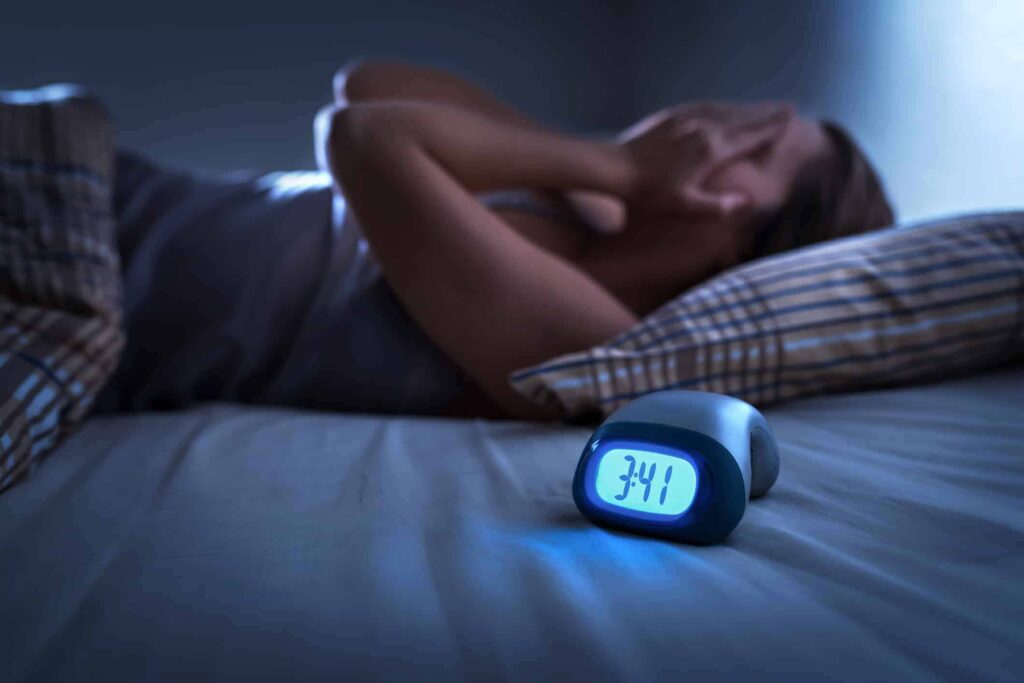Insomnia is a form of disordered sleeping characterized by difficulty falling asleep and staying asleep or waking up too early. Most people who have insomnia still feel tired after waking up, even if they’ve gotten their full eight hours of sleep.
Insomnia can lead to decreased energy and mood swings and can interfere with health and work performance. Insomnia tends to disturb people’s quality of life overall.
Stress from work or a traumatic event may cause short-term insomnia that will disappear on its own. Insomnia that lasts for over a month usually needs to be treated with significant lifestyle and daily habit changes.
Causes
Chronic insomnia is a common side effect of stress or sleep-disrupting habits. Mitigating any of the following causes can help eliminate insomnia, though it may take some time.
Stress

Stress about work, school, family life, or finances can keep you up at night. Traumatic life events like a sudden death or vehicle accident are likely to cause insomnia as well. Cutting stress out of your life is easier said than done, but avoiding heavy workloads when possible and refraining from situations you think might stress you out can help. Unfortunately, some stressors are out of our hands.
Work and travel

Jobs that require shift work or travel can disturb circadian rhythm—the body’s natural internal clock. Sleeping and waking up at different times each day tends to upset the circadian rhythm, leading to insomnia and disturbed metabolism and body temperature.
Caffeine and alcohol intake

If you are sensitive to caffeine, it may be keeping you up at night. Try to limit yourself to one cup of coffee in the morning and avoid drinking caffeine at least six hours before bed. Alcohol helps some people fall asleep, but it prevents you from reaching deep sleep stages and may cause waking in the night.
Eating late at night

Eating large portions of food before bed may cause discomfort while you lay down. Eating right before bed can cause heartburn and acid reflux, which can, in turn, keep you awake.
Poor sleeping habits in general

Going to bed at irregular times, taking naps, or doing stimulating activities before bed can disrupt sleep. Spending too much time watching TV or on mobile devices can also interfere with your sleep cycle.
Chronic insomnia is sometimes related to medical conditions and certain medications. Treating an underlying medical condition can help with insomnia. Here are 10 tips to improve your sleeping habits.
In addition to lifestyle habits, insomnia can be caused by:
Mental health disorders
Anxiety, PTSD, depression, and other mental health conditions can contribute to insomnia.
Medications
Anti-depressants or medicines for asthma and blood pressure can interfere with sleep patterns. Some over the counter medications, such as pain or allergy and cold medications, can cause insomnia due to the presence of caffeine in them.
Medical conditions
Conditions such as chronic pain, cancer, diabetes, heart disease, Parkinson’s disease, Alzheimer’s, and asthma can cause insomnia.
Other sleep-related disorders
Conditions like sleep apnea can cause you to stop breathing throughout the night, waking you up. People with restless leg syndrome may have difficulty falling asleep due to their desire to move.
Types of Insomnia
Acute insomnia
- Lasts up to one month
- Occurs due to situational stress from work, school, or other life events
- Generally disappears once the stressor disappears
Transient insomnia
- Lasts for less than one week
- Caused by stress, changes in the sleep environment, or as a symptom of depression
Chronic insomnia
- Persists for over a month
- Often associated with medical and mental health conditions
- Tends to affect people with an underlying risk of insomnia
Risk Factors
Anyone can experience insomnia, but the following groups are at an increased risk for the condition:
- Women
- People over 60
- People with mental health disorders or physical health conditions
- People under heavy stress
- People with irregular sleep schedules
Symptoms
Insomnia symptoms can include:
- Difficulty falling asleep
- Repeatedly waking up during the night
- Waking up too early
- Feeling tired after a full night’s sleep
- Daytime fatigue
- Irritability, depression, and anxiety
- Brain fog, difficulty focusing, and difficulty remembering
- Increased errors or accidents at work and in life
Treatment
There is no one cure for insomnia. Insomnia treatment usually requires changes in lifestyle and daily habits. Good sleep habits that can help eliminate and prevent insomnia include:
- Maintaining a consistent sleep schedule; try to go to bed and wake up at the same time every day.
- Exercising
- Regulating or eliminating medications that can contribute to insomnia
- Limit or avoid napping
- Reduce or eliminate alcohol, caffeine, and nicotine intake
- Avoid eating large portions of food before bed.
- Create a comfortable sleeping environment. Try to use your bed for sleep only.
- Limit screen time before bed. Try not to watch TV, play video games, or spend time on a mobile device. Reading or listening to music are better ways to wind down before bed.
If lifestyle changes do not lead to improved insomnia symptoms, consult your doctor. Mental health disorders or underlying medical conditions may be the culprit. If you are interested in learning more about insomnia, request an appointment, fill out our online intake form, or call us directly.



